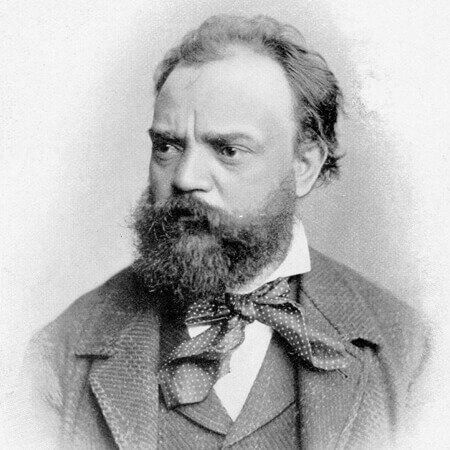
This evening’s concert is devoted to the music of the Czech composer Antonín Dvořák. His Cello Concerto and his 9th Symphony, known as "From the New World", are acclaimed masterpieces. They were written within a year of one another. Though composed second, our concert will begin with the Cello Concerto.
Antonín Dvořák was born and raised, in a small town near Prague, by his devout Roman Catholic parents. He was the eldest of their 14 children and, unlike the rest of his siblings, demonstrated his musical gifts from an early age. At six, he was learning to play the violin and by his early teens he was composing. The young boy's phenomenal gifts persuaded his father to allow him to study organ at Prague's Organ School with a view to graduating as a church organist.
By the time he was 17, Antonín was part of a Pops orchestra, playing at all kinds of social functions while earning a pittance.
Bohemian and Moravian folk music began to inspire his compositions. Nevertheless, though his original music coupled with his mastery of many instruments impressed his listeners, he failed to find lucrative employment and spent much of his twenties sharing squalid lodgings with five other impecunious performers. Not until he was 36, married and father of the first of his nine children, did Dvořák win the Austrian First Prize in music, enabling him to devote his life to composing.
At 52, Dvořák was invited to direct the National Conservatory of Music in New York. He and his family crossed the Pond to assume his new and exalted position. Though his life in the United States lasted less than three years, they were among the most productive of his illustrious career. Both of tonight’s compositions were written during that period.
In his early 20s, Dvořák had started composing a cello concerto in A major for his friend Ludevit Peer. For some unknown reason, it was never orchestrated. The truth is that no major composer had ever written a concerto for solo cello.
As we heard in last month's concert, Brahms wrote one for violin and cello and, in 1803, Beethoven composed one for violin, cello and piano. However, Victor Herbert, an Irish/American composer, premiered his own cello concerto in New York in 1894. At the time, Herbert was a professor at the National Conservatory of Music where Dvořák was Director. We know that Dvořák attended at least two performances of Herbert's cello concerto. Meanwhile, the gifted cellist, Hanus Wihan was begging for such a work from his friend Antonín. The result is what we are about to hear.
Our soloist, Zuill Bailey, needs no introduction to our audience. Suffice it to say that this world-renowned GRAMMY Award-winning cellist has been both a friend and a musical collaborator with our Maestra Sebrina Alfonso since his student days at Johns Hopkins Peabody Conservatory.
This technically challenging concerto is scored in the conventional three movements. The allegro first movement begins with the theme being introduced quietly by the clarinets. Later, a second subject is played by the French horn. The movement ends, as it began, with the first theme. That theme will reappear in the final movement. The second movement takes the form of a lyrical adagio. The concerto concludes more or less in rondo form. It opens with the main theme being softly introduced by the French horn. The full orchestra brings the concerto to a rousing conclusion.
Program note by Ian A. Fraser